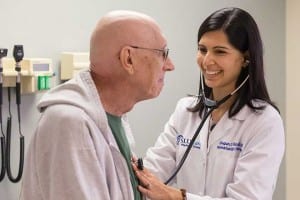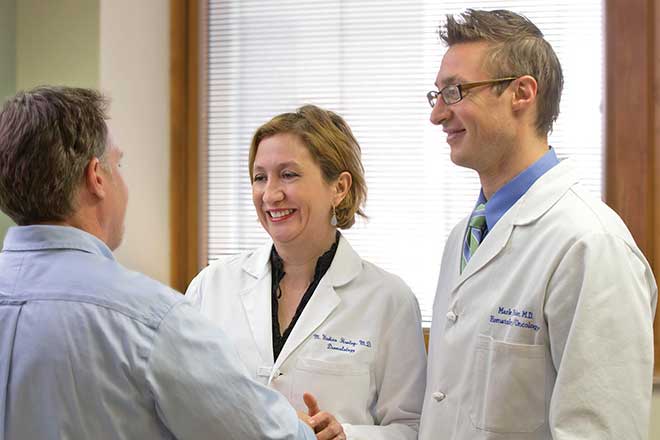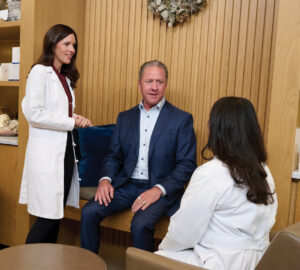Cancer is a complex disease. Unpredictable by nature, it baffles and overwhelms those it strikes. But at Saint Louis University Cancer Center, patients have a power team of physicians and sophisticated treatments in their corner to meet the challenges head-on.
Created in 2002 as a partnership between SLUCare Physician Group and Saint Louis University Hospital, SLU Cancer Center is the second largest in the region. It’s based on a dual focus: cancer research and comprehensive, compassionate care. It is recognized for its expertise in a long list of cancers, including skin, head and neck, leukemia, lymphoma, eye, bone, bone marrow, gynecologic, breast, lung, urologic, GI and brain, with more than 70 specialized cancer physicians. “A cancer center like this that focuses on the trifecta of research and clinical trials, a multidisciplinary approach, and compassionate care is going to be able to provide the best treatment,” says the center’s interim director, Dr. Scott Fosko, SLUCare Physician Group practitioner and chairman at SLU School of Medicine’s department of dermatology.
The center’s multidisciplinary approach is key to providing the best care possible, says Fosko. “There are so many elements of care, so many components that go into putting together an outstanding treatment plan,” he says. “A cancer center that understands the nuances of different stages of the disease is going to deliver better care. When things become more complicated, you have to have the ability to manage that, and that’s what we offer. We have so many different physicians with so many different specialties, it really helps us advance the care of our patients.” For example, the center’s melanoma program includes a collaborative team of dermatologists, surgical pathologists, Mohs surgeons, surgical and radiation oncologists, plastic surgeons, dermatopathologists and more, Fosko explains.

Similarly, patients with cutaneous lymphoma, a complex cancer affecting the white blood cells and involving the skin, lymph nodes and blood, have the resources of the multidisciplinary Cutaneous Lymphoma Clinic. Patients see both Dr. Mark Fesler and Dr. M. Yadira Hurley, who together head the clinic. “Cutaneous lymphomas often require a combination of systemic and skin-directed therapies for optimal treatment,” Hurley says. “Dr. Fesler manages systemic chemotherapies, and I manage skin-directed therapies and assess for cutaneous response.” Patients can get lab draws, bone marrow biopsies, infusions and PET/CT scans on the same day as their appointment, decreasing the frequency of office visits, she adds.
The center works to make treatment as comfortable and convenient as possible for patients with any type of cancer. The Outpatient Bone Marrow Transplant Center, opened in 2012 at SLU Hospital, is the first of its kind in the area. “Traditionally, patients would have to undergo a complicated procedure, and then be hospitalized,” Fosko says. “This provides an outpatient alternative and helps improve patient quality of life during treatment.”
Fosko explains that SLU Cancer Center is based on three components that together perpetuate the highest level of treatment, now and in the future: patient care, education and research. SLU patients can choose to participate in clinical trials, which offers them more options for their care. The clinical trials advance research efforts, which in turn pave the way for future cutting-edge therapies, all providing fertile training ground for SLU Medical School students, residents and subspecialty fellowships.
Clinical trials bridge the gap between research efforts and cutting-edge therapies. Around 100 such trials are currently underway at SLU Cancer Center. “Having a portfolio of clinical trials we can offer our patients when it’s appropriate in their treatment is an important part of our service,” says Dr. Carl Freter, division director of SLUCare Hematology and Oncology. “It provides choices for people who have run out of options with conventional therapy.”
One trial currently underway at the center involves the incubation of cancer cells with interleukin-2, a protein that regulates white blood cells. “It has the potential to be extremely effective in rapidly destroying cancer cells by harnessing the body’s immune system to attack only the cancer cells, and not normal cells,” Freter explains.
Research also is being done on Vismodegib, recently FDA-approved for treating metastatic and advanced basal cell carcinoma. The drug is an oral agent that provides ultra-targeted therapy, working only on a specific area of the cell to shrink the tumor. The cancer center is conducting research trials to understand how to best utilize the drug and which patients it will benefit the most. “This is an exciting advancement for basal cell carcinoma, where we traditionally would use surgery or radiation to treat these advanced cancers,” Fosko says. “Now we have an oral agent that can be quite effective.”
In addition to all the center accomplishes in treatment and innovative research, SLU Cancer Center also reaches out to the community, says Fosko. A number of initiatives are designed to assist underserved populations. The Center for Cancer Prevention, Research and Outreach, operated in partnership with SLU’s College for Public Health & Social Justice and co-directed by Fosko and Dr. Ricardo Wray, is a program that seeks to address the high breast and prostate cancer rates in North St. Louis by collaborating with community groups to bring screening to high-risk populations.
Each person faced with a cancer diagnosis depends on their doctors to put them on the road to good health. With SLU Cancer Center’s strength in both care and research, and its affiliation with SLU Medical School, patients are given the best fighting chance possible, Fosko says. “Bringing all those elements together makes a cancer center robust and enables us to drive innovation,” he explains. “It allows us to focus on outstanding outcomes for patients, improving their quality of life during treatment and increasing their chances of survival.”
Pictured: Dr. Yadira Hurley, SLUCare dermatopathologist, and Dr. Mark Fesler, SLUCare hematologist and oncologist.
Photos courtesy of SLUCare Physician Group
[Saint Louis University Cancer Center, located at 3655 Vista Ave., is a joint venture between SLUCare Physician Group and Saint Louis University Hospital. The second largest cancer center in the region, it is focused on providing compassionate, patient-centered clinical services and developing new cancer research programs. For more information, call 314.268.7015 or visit cancercenter.slu.edu.]








